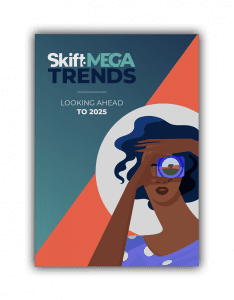Travel Megatrends 2021: More Mainstream Short-Term Rentals Cope With New Headwinds

Skift Take

In January 2021 we released our annual travel industry trends forecast, Skift Megatrends. Because of the havoc that the pandemic triggered, we wrote Skift Travel Megatrends 2021 as a vision of how travel industry dynamics could play out five years from now. You can read about each of the trends on Skift, or download a copy here.
The term “alternative accommodations,” already a near-anachronism in 2020, loses all meaning five years later. Most major booking sites have long ceased listing separate categories for hotels, homes or apartments, and favored “stays” as a catch-all bucket because accommodation types were melding together.
After all, in 2025 Airbnb is offering short-term apartment and vacation rentals, has revived its boutique hotel business, and is booking rooms for a scattered number of property owners at larger chains. Airbnb, Expedia and Alibaba were also among the booking sites marketing hotels and other stays under their own brands.
Four Seasons had portions of several of its resorts dedicated to private residences. Hilton follows Marriott’s lead and dabbles in vacation rentals while Hyatt revives its on-again and off-again participation in the sector.
The blockbuster Airbnb initial public offering of late 2020 took the company and short-term rentals even more mainstream in the following years. As seen in the chart, a surge began in March and April 2020 when the average length of stay in vacation rentals doubled to more than eight days around the world. But that had lost its urgency in 2025, when traditional hotels, with more vigorous health and safety standards in place, reasserted themselves, although short-term rentals gained much ground in the interim.
There are competing dynamics at work that influence the short-term rental sector’s trajectory.
Professional vacation rental managers and quasi-hotel companies become more influential, and their rentals tend to dominate the listings’ space and revenue streams of platforms like Airbnb, and those of emerging competitors. This was good for business travelers and other guests in terms of getting a standardized experience, albeit one with less local spice or contact with individual hosts.
Global Average Length of Stay in Vacation Rentals

If professionalization led to iPads at properties pointing guests to a nearby Chili’s Bar & Grill instead of host Juanita herding her guests to the Ear Inn in a landmark building in lower Manhattan for drinks and a poetry reading, the guests arrive anyway if the rental price was right.
So-called mom-and-pop hosts, namely people who owned just a property or two, feel the squeeze and try to fend for themselves. Some turn their properties into yearly rentals or office space when market conditions allow. Several startups emerge that tried to bring the “local” back into short-term rentals, offering only listings from individual hosts. It is a niche strategy, though, with well-funded corporate hosts having the upper hand.
While the majority of travelers in many parts of the world in 2025 regularly consider a broad array of accommodations’ choices, including hotels and short-term rentals, cities that bounced back post-pandemic increasingly put limitations on the growth of short-term rentals. Many cities, seeking to reclaim their affordable housing stock or to curb house parties and other forms of disruption, either ban short-term rentals outright, or severely crimp the number of lawful registrations.
Increased regulation of short-term rentals led Airbnb to more closely resemble Booking.com, Trip.com Group, and Expedia as Airbnb opt to build its hotel portfolio, get into the flights business, and go more mainstream with its previously curated and money-losing tours and activities’ business.
After all, the growth has to come from somewhere.
Skift Megatrends 2021 is made possible by our parters: Abu Dhabi Convention & Exhibition Bureau, Accor, and American Express.





